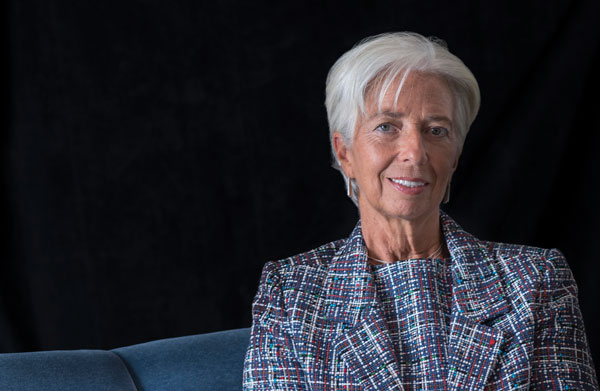In a letter to the next generation, Christine Lagarde calls for a renewed commitment to global economic cooperation

Dear Friends: I want to share with you a bit of our history and some thoughts about the future—your future! Seventy-five years ago, delegates from more than 40 countries met to agree on new rules for the global economy. It was a hot summer, so they gathered in the cool mountains of New Hampshire at the Bretton Woods resort. Most came from countries that were still engulfed in the flames of World War II.
They vowed to avoid the mistakes that led to that terrible conflict. In the prewar period, instead of working together, countries pursued protectionist economic policies that only made the Great Depression worse. The result was mass unemployment and mass anger. The seeds were sown for authoritarianism, aggression, and war.
Bretton Woods launched a new era of global economic cooperation, in which countries helped themselves by helping each other. They set out to prove that solidarity was self-interest. The delegates established the International Monetary Fund and charged it with three critical missions: promoting international monetary cooperation, supporting the expansion of trade and economic growth, and discouraging policies that would harm prosperity.
Since then, the world economy has changed in fundamental ways. Throughout its 75-year history, the IMF has adapted to these changes while staying true to its mandate. Today, it continues to serve its members—who now number 189—with “wallet, brain, and heart”: by providing high-caliber policy advice, technical assistance, and training to strengthen institutions and capacity; giving financial support and breathing space to countries in crisis while they undertake needed policy steps; and designing better policies to improve people’s lives.
Did the delegates succeed in their goals? Emphatically, yes. Today, most people live longer, healthier, better lives. Countries trade more with each other, which helps them grow faster, creates more jobs, and lifts incomes. In low-income countries, trade has reduced the cost of living for a typical family by two-thirds, and in advanced economies, by a quarter. And globally, more than 1 billion people have climbed out of poverty.
At the same time, far too many still suffer from poverty and lack of opportunity. Young people are among the most disadvantaged. Many low-income countries will struggle to meet their Sustainable Development Goals by 2030, depriving new generations of the opportunity to succeed on their own terms. Poverty, rising inequality, and new technologies have sparked anger and resentment. Corruption has led to a loss of trust in institutions.
All these changes have been feeding into sentiments that give rise to unilateral, go-it-alone approaches. History teaches us this is a ruinous path. It can lead to an “Age of Anger,” when international trust and cooperation could break down—as happened after the Great Depression.
Creating opportunity
I do not believe, however, that this dystopian scenario is inevitable. On
the contrary, I believe that we have a responsibility to bring about an
“Age of Ingenuity,” and we need to have the courage to build it.
Cars, homes, and factories can be powered by renewable sources of energy.
Women can have the same opportunities and the same salaries as men.
Innovation—your
inventions—can create better opportunities for all.
How do we turn this vision into reality?
In part, the answer lies in what I call a “new multilateralism.” You might also call it common sense. It means ensuring that economic opportunity is shared more widely, so that young people everywhere have a chance to succeed and contribute to society. It means ensuring that governments and institutions work for the common good. It is about countries collaborating to tackle global challenges.
What needs to change?
First and foremost, policymakers must provide the conditions at home for people to succeed. Here, fiscal policy is crucial to create broader opportunities through access to quality education, health care, and infrastructure—especially for those who have been left behind. In many countries, this means paying special attention to young people and to women.
It also involves addressing excessive inequality. Here again, fiscal policy can play a key role, including through progressive tax measures that are country-specific and stronger social safety nets that can help address dislocations caused by technological change and globalization. Central banks need to guard against inflation—the worst tax on the poor. And regulators should protect the public against the kind of financial excess that led to the debilitating global financial crisis 10 years ago.
This kind of policy action can help build confidence and trust—and overcome perceptions of unfair sharing of economic benefits.
At the international level, we need to provide a more level playing field across borders. Here, trade looms large. We know that, for many decades, opening borders to trade has spread new technologies, boosted productivity, and created millions of new jobs with higher wages. At the same time, we know that not everyone has benefited—that there are distortions in the trade system and that it needs to be reformed.
International taxation is another challenge. We must make sure that international companies pay their fair share of taxes. Without reform of international corporate taxation, countries will be deprived of tax revenue they need to fund essential investment in people and infrastructure.
These are some of the challenges I see. And there are two more that you, the next generation, have brought to the world’s attention.
Here, I am thinking of climate change, which threatens the very future of our planet. You may have experienced the growing impact firsthand, from wildfires in California to tropical storms in Mozambique. And you certainly know that greener economic policies could help address this existential threat. To put it differently, if you do not have a plan for the environment, you do not have a plan for the economy.
The other issue on the minds of young people is corruption. You see it as unjust, and rightly so. The annual global cost of bribery alone amounts to $1.5 to $2 trillion. And that does not take into account the corrosive effect of corruption on society. We must cure the cancer of corruption if we are to build a fairer and stronger economy.
Speaking at the original Bretton Woods conference, US Treasury Secretary Henry Morgenthau Jr. said:
“Prosperity has no fixed limits… Prosperity, like peace, is indivisible. We cannot afford to have it scattered here or there among the fortunate or to enjoy it at the expense of others.”
Seventy-five years on, the list of challenges seems daunting. But no more so than the list confronted by the delegates when they met in New Hampshire. I believe it is time once again to renew our commitment to global economic cooperation, so that we can achieve greater prosperity—not just for the fortunate few, but for all.
Sincerely,
Christine Lagarde
Opinions expressed in articles and other materials are those of the authors; they do not necessarily reflect IMF policy.







